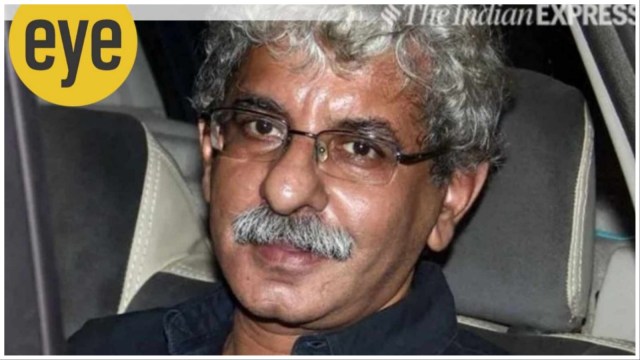Sriram Raghavan wants to seduce, surprise, involve and entertain the audience
Screenwriter-editor Pooja Ladha Surti writes about her unique creative partnership with director Sriram Raghavan spanning two decades
 Sriram Raghavan's latest film, Merry Christmas, stars Katrina Kaif and Vijay Sethupathi in lead roles. (Pic: Varinder Chawla)
Sriram Raghavan's latest film, Merry Christmas, stars Katrina Kaif and Vijay Sethupathi in lead roles. (Pic: Varinder Chawla) Written by Pooja Ladha Surti
The two Sriram Raghavan films I have experienced as a pure viewer are Eight Column Affair, his delightful FTII diploma film, and Raman Raghav (What a film! A tour de force). But, happily for me, I have been part of the core team of all of Sriram’s films since his directorial debut with Ek Hasina Thi (2004), which was also my first film as a writer.
What I admire about Sriram, as a film technician and director, is that he has a very healthy respect for the viewer. He wants to seduce, surprise, involve and entertain the audience. I think he remembers being held spellbound by the movies inside a darkened theatre — and he tries his best to evoke, for his viewers, a dash of that same frisson and excitement.
Sometimes, while trying to make a point, Sriram will narrate a whole film (or relevant chunks of it) made by Alfred Hitchcock or Vijay Anand or Brian DePalma or Bimal Roy. Those narrations and anecdotes are just pure gold. He’s a film nerd, and a bit of an encyclopedia on the films and filmmakers he loves and admires.
We have a shared love of retro Hindi film music. Both of us, in our individual childhoods, learned Hindi from the movies, from the lyrics and dialogues. Both of us are also avid readers, so that is another connection. We read crime fiction, detective novels, hardboiled pulp paperbacks, murder mysteries — all sorts of books.
 Editor-screenwriter Pooja Ladha Surti with Merry Christmas lead actors Katrina Kaif and Vijay Sethupathi.
Editor-screenwriter Pooja Ladha Surti with Merry Christmas lead actors Katrina Kaif and Vijay Sethupathi.
I believe Sriram and I established a friendship, a kinship even, from Ek Hasina Thi days. He has a droll sense of humour. He thought my screenplay for Ek Hasina Thi was a novella (It kind of was.). I was willing to learn and adapt. Sriram was directing his first feature film and, somehow, we got along and ambled along.
For all the films we have done together since Johnny Gaddaar, I’m on board from the writing stage till the final mix. I am also present on the sets as an associate director. It’s the kind of collaboration that requires mutual trust – ego hassles and toxic insecurities have zero value, but a willingness to listen even while disagreeing, is important.
He has taught me a lot about writing for film. He is a really, really solid writer. He’s relentlessly hardworking, refuses to be happy with himself (or the rest of us), and keeps working the material this way and that, till there is a distilled thought driving every scene. Still, he’ll leave room for improvement. When actors enter the process, or when other heads of departments start weighing in, or the team of assistant directors react with their thoughts and ideas, Sriram is sharply attentive. He’s incredibly open to ideas and suggestions.
I am sometimes quick to react, and I try to learn how to be a bit zen from him. Whatever you learn from Sriram, you imbibe. He’s not trying to teach you. He is easygoing with his assistants and other unit members, encourages people to work hard, does not tolerate sloppiness and is deeply loved and admired by the entire unit.
While editing, I get a certain degree of autonomy. He leaves me alone to make the first cuts, trusting me to choose the best performances and shots to create a blueprint for the internal rhythm of the film. Once that is done, we sit together and pare down or expand scenes. Sometimes we might have a major difference of opinion. In such cases, we will have two distinct versions to choose from at the final edit stage.
I have a sense of what the story needs because of being on the writing team and a fair idea of what Sriram is trying to achieve on the sets. What is on paper is interpreted on the set by myriad technicians and actors. So, an understanding of the director’s vision becomes essential if you want to execute it in the edit.
 A still from Sriram Raghavan-directed Merry Christmas.
A still from Sriram Raghavan-directed Merry Christmas.
Sriram’s vision is unique, quirky and fun but somehow also serious minded. Morally ambiguous but also deeply moral. Characters that attract him will usually commit some sort of crime and pay the price. But even as he tackled a romantic story in Merry Christmas, his next Ikkis is a drama set in and around the 1971 Indo-Pak war.
Our latest collaboration, Merry Christmas, is a movie I am proud of. It has what many might consider a slow-burn pace, but it is a choice we made — I actually saw it as roiling, frenetic inside the heads of Maria (especially) and Albert. When for plot reasons you can’t show certain aspects, you hope the viewer will put two and two together. For me though, the opportunity to explore the suspense and tension and thrill and quiver of romance couched in a crime story was so much fun I can’t even tell you.
Photos



- 01
- 02
- 03
- 04
- 05




























